By Yonathan Listik · Tuesday, November 27, 2012 As an occasional feature on TELOSscope, we highlight a past Telos article whose critical insights continue to illuminate our thinking and challenge our assumptions. Today, Yonathan Listik looks at Georg Lukács’s “The Old Culture and the New Culture” from Telos 5 (Spring 1970).
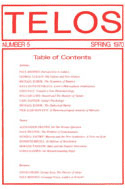 It would be simplistic to argue that behind the Marxist critiques of capitalist society there was only an objective intention simply to improve its effectiveness and avoid the political complications found in capitalist society. Despite its strict scientific tone, Marxism still carries a heavily moral intention. This is what Georg Lukács comes to argue in this essay on culture. In his analysis of capitalist cultural structure and its many differences from capitalist reality, Lukács points to what he regards as the ultimate goal behind communism: a new cultural order. It would be simplistic to argue that behind the Marxist critiques of capitalist society there was only an objective intention simply to improve its effectiveness and avoid the political complications found in capitalist society. Despite its strict scientific tone, Marxism still carries a heavily moral intention. This is what Georg Lukács comes to argue in this essay on culture. In his analysis of capitalist cultural structure and its many differences from capitalist reality, Lukács points to what he regards as the ultimate goal behind communism: a new cultural order.
Continue reading →
By Maja Sidzinska · Tuesday, November 20, 2012 As an occasional feature on TELOSscope, we highlight a past Telos article whose critical insights continue to illuminate our thinking and challenge our assumptions. Today, Maja Sidzinska looks at Joan Landes’s “Feminism and the Internationals” from Telos 49 (Fall 1981).
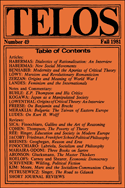 Although 2012 is being hailed as the new Year of the Woman and women’s votes were solicited and cited as pivotal to the outcome of the U.S. presidential election, Joan Landes’s 1981 article “Feminism and the Internationals” provides a timely reminder about the strategic ways that women’s and feminist movements have been deployed in service of political agendas in body politics past. Landes illustrates the historical subordination of women’s and feminist concerns in socialist paradigms and states, shows that the personal was treated as apolitical, and alludes to male epistemic authority as begetting these developments. From the vantage point of Marxist socialism, the problem with feminism is that it undermines the unified class struggle by introducing a competing concern—gender—that threatens the cohesion of the socialist movement. Although 2012 is being hailed as the new Year of the Woman and women’s votes were solicited and cited as pivotal to the outcome of the U.S. presidential election, Joan Landes’s 1981 article “Feminism and the Internationals” provides a timely reminder about the strategic ways that women’s and feminist movements have been deployed in service of political agendas in body politics past. Landes illustrates the historical subordination of women’s and feminist concerns in socialist paradigms and states, shows that the personal was treated as apolitical, and alludes to male epistemic authority as begetting these developments. From the vantage point of Marxist socialism, the problem with feminism is that it undermines the unified class struggle by introducing a competing concern—gender—that threatens the cohesion of the socialist movement.
Continue reading →
By Damien Booth · Tuesday, October 16, 2012 As an occasional feature on TELOSscope, we highlight a past Telos article whose critical insights continue to illuminate our thinking and challenge our assumptions. Today, Damien Booth looks at Ronald Aronson’s “Interpreting Husserl and Heidegger: The Root of Sartre’s Thought” from Telos 13 (Fall 1972).
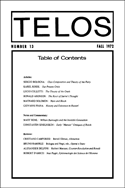 Readers familiar with Jean-Paul Sartre’s philosophical writings understand that he inherited a great deal of his conceptual language from the phenomenological projects of Edmund Husserl and Martin Heidegger. In “Interpreting Husserl and Heidegger: The Root of Sartre’s Thought,” Ronald Aronson strips away much of the mystery from Sartre’s concepts and, in so doing, reveals something about the framework that Sartre inherits that may well restrict his philosophical project from the very start. The accusation Aronson levies against Sartre is that he opens up a gap between consciousness and the world, a gap that Husserl wished to close by developing his transcendental phenomenological method. Essentially, Aronson thinks that Sartre abandons the very developments that made Husserl’s and Heidegger’s projects tenable in the first place: “we find [Sartre] erasing all the structures of consciousness (emotional, cognitive, and social) which make the world intelligible and making consciousness into a ‘nothing'” (47). As a result, Sartre becomes tangled up in his “own conceptual apparatus.” To find out why he gets so conceptually confused by these entanglements, Aronson traces Sartre’s key concepts back to their roots in Husserl’s cognitive projects and Heidegger’s hermeneutic phenomenology. Readers familiar with Jean-Paul Sartre’s philosophical writings understand that he inherited a great deal of his conceptual language from the phenomenological projects of Edmund Husserl and Martin Heidegger. In “Interpreting Husserl and Heidegger: The Root of Sartre’s Thought,” Ronald Aronson strips away much of the mystery from Sartre’s concepts and, in so doing, reveals something about the framework that Sartre inherits that may well restrict his philosophical project from the very start. The accusation Aronson levies against Sartre is that he opens up a gap between consciousness and the world, a gap that Husserl wished to close by developing his transcendental phenomenological method. Essentially, Aronson thinks that Sartre abandons the very developments that made Husserl’s and Heidegger’s projects tenable in the first place: “we find [Sartre] erasing all the structures of consciousness (emotional, cognitive, and social) which make the world intelligible and making consciousness into a ‘nothing'” (47). As a result, Sartre becomes tangled up in his “own conceptual apparatus.” To find out why he gets so conceptually confused by these entanglements, Aronson traces Sartre’s key concepts back to their roots in Husserl’s cognitive projects and Heidegger’s hermeneutic phenomenology.
Continue reading →
By Katherine McGinity · Tuesday, October 9, 2012 As an occasional feature on TELOSscope, we highlight a past Telos article whose critical insights continue to illuminate our thinking and challenge our assumptions. Today, Katherine McGinity looks at Dimitri Ginev’s “The Erotic Attitude Toward Nature and Cognitive Existentialism” from Telos 152 (Fall 2010).
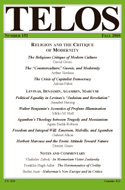 Dimitri Ginev’s “The Erotic Attitude Toward Nature and Cognitive Existentialism” seeks to uncover ways in which Herbert Marcuse’s call for a “new science” could be achieved in current scientific research. Marcuse’s ideas are committed to an “erotic” attitude toward nature that moves away from the technological rationality that drives scientific research. Marcuse posits that engaging in an erotic attitude toward nature would allow natural entities to “be what they are” and reveal their inherent aesthetic qualities. According to Marcuse, this dramatic shift in scientific research would change essentialist thinking about science and its norms of objectivity. Ginev shares Marcuse’s feeling that current scientific research methods are problematic in their reductive approach to nature as something that can be controlled and manipulated. However, Ginev points out that attempting to dismantle the subjective-objective structure of modern science proves difficult based solely in Marcuse’s outline. Dimitri Ginev’s “The Erotic Attitude Toward Nature and Cognitive Existentialism” seeks to uncover ways in which Herbert Marcuse’s call for a “new science” could be achieved in current scientific research. Marcuse’s ideas are committed to an “erotic” attitude toward nature that moves away from the technological rationality that drives scientific research. Marcuse posits that engaging in an erotic attitude toward nature would allow natural entities to “be what they are” and reveal their inherent aesthetic qualities. According to Marcuse, this dramatic shift in scientific research would change essentialist thinking about science and its norms of objectivity. Ginev shares Marcuse’s feeling that current scientific research methods are problematic in their reductive approach to nature as something that can be controlled and manipulated. However, Ginev points out that attempting to dismantle the subjective-objective structure of modern science proves difficult based solely in Marcuse’s outline.
Continue reading →
By Tomash Dabrowski · Tuesday, October 2, 2012 As an occasional feature on TELOSscope, we highlight a past Telos article whose critical insights continue to illuminate our thinking and challenge our assumptions. Today, Tomash Dabrowski looks at Richard Wolin’s “An Aesthetic of Redemption: Benjamin’s Path to Trauerspiel“ from Telos 43 (Spring 1980).
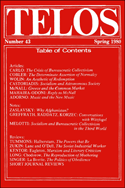 Despite renewed interest in Walter Benjamin, his work still remains enigmatic seventy years after his death, and the obscurity of his thought is compounded by the efforts of friends and associates wishing to reclaim his work to their respective traditions. Those who knew him during his lifetime—and especially those instrumental to the belated dissemination of his work—sometimes repudiate his theological motifs, others his particular variant of Marxism (or questioning whether he could be called a Marxist at all). But there seems to be a consensus as to their incongruity. Adorno for instance once chastised Benjamin’s work as “undialectical,” and Gershom Scholem found his theology to be plagued by ill-conceived communist alliances (which is to say nothing about his dispute with Hannah Arendt about which school of thought Benjamin’s contribution legitimately lies). Leszek Kołakowski’s reading, in his eminent Main Currents of Marxism, is emblematic of the mischief caused by measuring Benjamin’s work against the weight of tradition. Kołakowski finds that Benjamin “seems to have tried to graft historical materialism on his own theory of culture, which had nothing to do with Marxism and which he had worked out beforehand.” Despite renewed interest in Walter Benjamin, his work still remains enigmatic seventy years after his death, and the obscurity of his thought is compounded by the efforts of friends and associates wishing to reclaim his work to their respective traditions. Those who knew him during his lifetime—and especially those instrumental to the belated dissemination of his work—sometimes repudiate his theological motifs, others his particular variant of Marxism (or questioning whether he could be called a Marxist at all). But there seems to be a consensus as to their incongruity. Adorno for instance once chastised Benjamin’s work as “undialectical,” and Gershom Scholem found his theology to be plagued by ill-conceived communist alliances (which is to say nothing about his dispute with Hannah Arendt about which school of thought Benjamin’s contribution legitimately lies). Leszek Kołakowski’s reading, in his eminent Main Currents of Marxism, is emblematic of the mischief caused by measuring Benjamin’s work against the weight of tradition. Kołakowski finds that Benjamin “seems to have tried to graft historical materialism on his own theory of culture, which had nothing to do with Marxism and which he had worked out beforehand.”
Continue reading →
By James Santucci · Tuesday, September 4, 2012 As an occasional feature on TELOSscope, we highlight a past Telos article whose critical insights continue to illuminate our thinking and challenge our assumptions. Today, James Santucci looks at Fredy Perlman’s “Essay on Commodity Fetishism” from Telos 6 (Fall 1970).
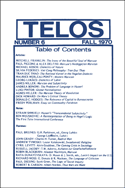 Two interesting things happened in the brouhaha over the proper antecedent of “that” in “You didn’t build that.” First, Dylan Matthews, a senior at Harvard who writes for Ezra Klein’s Wonkblog, explained several different theories of dessert and how each interpretation would inform the intent behind President Obama’s phrase. Soon afterward, Rush Limbaugh attempted to discredit Matthews’s and the Obama campaign’s defenses of the statement by accusing them of working with words. Never mind that they were accused of working with words; what we’re interested in is the suggestion that there is a fundamental antithesis between working with words and materially engaging with the world. Without meaning to do so, the two provided a perfect context for reading Fredy Perlman’s “Essay on Commodity Fetishism.” A close reading of the essay reveals that not only is there no antithesis, but also that because of the theory of the commodity fetish, Marxism is material engagement with real phenomena. Two interesting things happened in the brouhaha over the proper antecedent of “that” in “You didn’t build that.” First, Dylan Matthews, a senior at Harvard who writes for Ezra Klein’s Wonkblog, explained several different theories of dessert and how each interpretation would inform the intent behind President Obama’s phrase. Soon afterward, Rush Limbaugh attempted to discredit Matthews’s and the Obama campaign’s defenses of the statement by accusing them of working with words. Never mind that they were accused of working with words; what we’re interested in is the suggestion that there is a fundamental antithesis between working with words and materially engaging with the world. Without meaning to do so, the two provided a perfect context for reading Fredy Perlman’s “Essay on Commodity Fetishism.” A close reading of the essay reveals that not only is there no antithesis, but also that because of the theory of the commodity fetish, Marxism is material engagement with real phenomena.
Continue reading →
|
|
 It would be simplistic to argue that behind the Marxist critiques of capitalist society there was only an objective intention simply to improve its effectiveness and avoid the political complications found in capitalist society. Despite its strict scientific tone, Marxism still carries a heavily moral intention. This is what Georg Lukács comes to argue in this essay on culture. In his analysis of capitalist cultural structure and its many differences from capitalist reality, Lukács points to what he regards as the ultimate goal behind communism: a new cultural order.
It would be simplistic to argue that behind the Marxist critiques of capitalist society there was only an objective intention simply to improve its effectiveness and avoid the political complications found in capitalist society. Despite its strict scientific tone, Marxism still carries a heavily moral intention. This is what Georg Lukács comes to argue in this essay on culture. In his analysis of capitalist cultural structure and its many differences from capitalist reality, Lukács points to what he regards as the ultimate goal behind communism: a new cultural order.  Although 2012 is being hailed as the new Year of the Woman and women’s votes were solicited and cited as pivotal to the outcome of the U.S. presidential election, Joan Landes’s 1981 article “Feminism and the Internationals” provides a timely reminder about the strategic ways that women’s and feminist movements have been deployed in service of political agendas in body politics past. Landes illustrates the historical subordination of women’s and feminist concerns in socialist paradigms and states, shows that the personal was treated as apolitical, and alludes to male epistemic authority as begetting these developments. From the vantage point of Marxist socialism, the problem with feminism is that it undermines the unified class struggle by introducing a competing concern—gender—that threatens the cohesion of the socialist movement.
Although 2012 is being hailed as the new Year of the Woman and women’s votes were solicited and cited as pivotal to the outcome of the U.S. presidential election, Joan Landes’s 1981 article “Feminism and the Internationals” provides a timely reminder about the strategic ways that women’s and feminist movements have been deployed in service of political agendas in body politics past. Landes illustrates the historical subordination of women’s and feminist concerns in socialist paradigms and states, shows that the personal was treated as apolitical, and alludes to male epistemic authority as begetting these developments. From the vantage point of Marxist socialism, the problem with feminism is that it undermines the unified class struggle by introducing a competing concern—gender—that threatens the cohesion of the socialist movement.  Readers familiar with Jean-Paul Sartre’s philosophical writings understand that he inherited a great deal of his conceptual language from the phenomenological projects of Edmund Husserl and Martin Heidegger. In “Interpreting Husserl and Heidegger: The Root of Sartre’s Thought,” Ronald Aronson strips away much of the mystery from Sartre’s concepts and, in so doing, reveals something about the framework that Sartre inherits that may well restrict his philosophical project from the very start. The accusation Aronson levies against Sartre is that he opens up a gap between consciousness and the world, a gap that Husserl wished to close by developing his transcendental phenomenological method. Essentially, Aronson thinks that Sartre abandons the very developments that made Husserl’s and Heidegger’s projects tenable in the first place: “we find [Sartre] erasing all the structures of consciousness (emotional, cognitive, and social) which make the world intelligible and making consciousness into a ‘nothing'” (47). As a result, Sartre becomes tangled up in his “own conceptual apparatus.” To find out why he gets so conceptually confused by these entanglements, Aronson traces Sartre’s key concepts back to their roots in Husserl’s cognitive projects and Heidegger’s hermeneutic phenomenology.
Readers familiar with Jean-Paul Sartre’s philosophical writings understand that he inherited a great deal of his conceptual language from the phenomenological projects of Edmund Husserl and Martin Heidegger. In “Interpreting Husserl and Heidegger: The Root of Sartre’s Thought,” Ronald Aronson strips away much of the mystery from Sartre’s concepts and, in so doing, reveals something about the framework that Sartre inherits that may well restrict his philosophical project from the very start. The accusation Aronson levies against Sartre is that he opens up a gap between consciousness and the world, a gap that Husserl wished to close by developing his transcendental phenomenological method. Essentially, Aronson thinks that Sartre abandons the very developments that made Husserl’s and Heidegger’s projects tenable in the first place: “we find [Sartre] erasing all the structures of consciousness (emotional, cognitive, and social) which make the world intelligible and making consciousness into a ‘nothing'” (47). As a result, Sartre becomes tangled up in his “own conceptual apparatus.” To find out why he gets so conceptually confused by these entanglements, Aronson traces Sartre’s key concepts back to their roots in Husserl’s cognitive projects and Heidegger’s hermeneutic phenomenology.  Dimitri Ginev’s “The Erotic Attitude Toward Nature and Cognitive Existentialism” seeks to uncover ways in which Herbert Marcuse’s call for a “new science” could be achieved in current scientific research. Marcuse’s ideas are committed to an “erotic” attitude toward nature that moves away from the technological rationality that drives scientific research. Marcuse posits that engaging in an erotic attitude toward nature would allow natural entities to “be what they are” and reveal their inherent aesthetic qualities. According to Marcuse, this dramatic shift in scientific research would change essentialist thinking about science and its norms of objectivity. Ginev shares Marcuse’s feeling that current scientific research methods are problematic in their reductive approach to nature as something that can be controlled and manipulated. However, Ginev points out that attempting to dismantle the subjective-objective structure of modern science proves difficult based solely in Marcuse’s outline.
Dimitri Ginev’s “The Erotic Attitude Toward Nature and Cognitive Existentialism” seeks to uncover ways in which Herbert Marcuse’s call for a “new science” could be achieved in current scientific research. Marcuse’s ideas are committed to an “erotic” attitude toward nature that moves away from the technological rationality that drives scientific research. Marcuse posits that engaging in an erotic attitude toward nature would allow natural entities to “be what they are” and reveal their inherent aesthetic qualities. According to Marcuse, this dramatic shift in scientific research would change essentialist thinking about science and its norms of objectivity. Ginev shares Marcuse’s feeling that current scientific research methods are problematic in their reductive approach to nature as something that can be controlled and manipulated. However, Ginev points out that attempting to dismantle the subjective-objective structure of modern science proves difficult based solely in Marcuse’s outline.  Despite renewed interest in Walter Benjamin, his work still remains enigmatic seventy years after his death, and the obscurity of his thought is compounded by the efforts of friends and associates wishing to reclaim his work to their respective traditions. Those who knew him during his lifetime—and especially those instrumental to the belated dissemination of his work—sometimes repudiate his theological motifs, others his particular variant of Marxism (or questioning whether he could be called a Marxist at all). But there seems to be a consensus as to their incongruity. Adorno for instance once chastised Benjamin’s work as “undialectical,” and Gershom Scholem found his theology to be plagued by ill-conceived communist alliances (which is to say nothing about his dispute with Hannah Arendt about which school of thought Benjamin’s contribution legitimately lies). Leszek Kołakowski’s reading, in his eminent Main Currents of Marxism, is emblematic of the mischief caused by measuring Benjamin’s work against the weight of tradition. Kołakowski finds that Benjamin “seems to have tried to graft historical materialism on his own theory of culture, which had nothing to do with Marxism and which he had worked out beforehand.”
Despite renewed interest in Walter Benjamin, his work still remains enigmatic seventy years after his death, and the obscurity of his thought is compounded by the efforts of friends and associates wishing to reclaim his work to their respective traditions. Those who knew him during his lifetime—and especially those instrumental to the belated dissemination of his work—sometimes repudiate his theological motifs, others his particular variant of Marxism (or questioning whether he could be called a Marxist at all). But there seems to be a consensus as to their incongruity. Adorno for instance once chastised Benjamin’s work as “undialectical,” and Gershom Scholem found his theology to be plagued by ill-conceived communist alliances (which is to say nothing about his dispute with Hannah Arendt about which school of thought Benjamin’s contribution legitimately lies). Leszek Kołakowski’s reading, in his eminent Main Currents of Marxism, is emblematic of the mischief caused by measuring Benjamin’s work against the weight of tradition. Kołakowski finds that Benjamin “seems to have tried to graft historical materialism on his own theory of culture, which had nothing to do with Marxism and which he had worked out beforehand.”  Two interesting things happened in the brouhaha over the proper antecedent of “that” in “You didn’t build that.” First, Dylan Matthews, a senior at Harvard who writes for Ezra Klein’s Wonkblog, explained several different theories of dessert and how each interpretation would inform the intent behind President Obama’s phrase. Soon afterward, Rush Limbaugh attempted to discredit Matthews’s and the Obama campaign’s defenses of the statement by accusing them of working with words. Never mind that they were accused of working with words; what we’re interested in is the suggestion that there is a fundamental antithesis between working with words and materially engaging with the world. Without meaning to do so, the two provided a perfect context for reading Fredy Perlman’s “Essay on Commodity Fetishism.” A close reading of the essay reveals that not only is there no antithesis, but also that because of the theory of the commodity fetish, Marxism is material engagement with real phenomena.
Two interesting things happened in the brouhaha over the proper antecedent of “that” in “You didn’t build that.” First, Dylan Matthews, a senior at Harvard who writes for Ezra Klein’s Wonkblog, explained several different theories of dessert and how each interpretation would inform the intent behind President Obama’s phrase. Soon afterward, Rush Limbaugh attempted to discredit Matthews’s and the Obama campaign’s defenses of the statement by accusing them of working with words. Never mind that they were accused of working with words; what we’re interested in is the suggestion that there is a fundamental antithesis between working with words and materially engaging with the world. Without meaning to do so, the two provided a perfect context for reading Fredy Perlman’s “Essay on Commodity Fetishism.” A close reading of the essay reveals that not only is there no antithesis, but also that because of the theory of the commodity fetish, Marxism is material engagement with real phenomena. 

